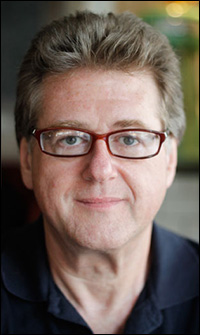
It's taken ten years for Robert L. Freedman and Steven Lutvak's musical A Gentleman's Guide to Love and Murder to slash its way to the Broadway stage. Adapted from the novel "Israel Rank" by Roy Horniman, which was the inspiration for the film "Kind Hearts and Coronets," starring Alec Guinness, the musical comedy follows Monty Navarro, a young man who learns he is ninth in line to inherit a fortune — and sets out to murder everyone who stands in his way.
Prior to its Broadway engagement, A Gentleman's Guide to Love and Murder made its world premiere at The Old Globe Theatre in San Diego, CA, and played an engagement at Hartford Stage. The Broadway production began previews Oct. 22 at the Walter Kerr Theatre, prior to a Nov. 17 opening, starring Bryce Pinkham as Monty and Tony winner Jefferson Mays (I Am My Own Wife) as the eight family members standing in his way.
Freedman and Lutvak previously collaborated on the musical Campaign of the Century. In 2006, the duo received the Kleban Award for Lyric Writing for the Theater and the Fred Ebb Award for Songwriting for the Theater — the first time these two awards were presented to the same team in the same year.
Freedman and Lutvak chatted with Playbill.com about the process of adapting the book into a musical and the secrets behind inspiring the audience to root for a murderer.
Tell us about the musical. How does a gentleman commit murder?
Robert L. Freedman: It's a revenge fantasy, but it's also a story about class, and we've got a poor boy who suddenly finds out that he's the black sheep heir to a great fortune and earldom, and he vows to, in any way possible, become an earl. And he knocks off the eight people standing in his way — and they're all played by the marvelous Jefferson Mays. We love the juxtaposition of the formality of that era. Our guy, Monty Navarro, is a complete gentleman at all times, and yet he's committing these heinous crimes. And that's where the comedy comes in. Steven Lutvak: I've always said that we all want to kill our families. But, because of the way we've done it here, we have the cathartic thrill of murdering these people, knowing that he will come back as somebody else. So we get to have our cake and eat it, too, in a certain way.
 |
||
| Robert L. Freedman |
RLF: We started out by making him a sympathetic character — the fact that he grew up without anything, didn't have any opportunities. The one woman he loves and has loved all his life won't marry him, because he's not wealthy and doesn't have position.
SL: And the other thing you do is you make all the people that he kills as despicable as possible. Delightfully despicable.
What is it about British entertainment that you think Americans love so much?
RLF: It's just a coincidence that "Downton Abbey" appeared as we were getting this show mounted. We actually started writing it in 2004. We're both big fans of "Downton Abbey." This is like "Downton Abbey" on acid, or "Downton Abbey" meets Little Shop of Horrors. We're not a horror story at all, but there is some suspense.
The musical seems to be saying a lot about class structures in British society. There's a song titled "I Don't Understand the Poor."
RLF: That's [sung by] one of the most heinous characters. He is the current earl, the eighth Earl of Highhurst, Lord D'Ysquith. He lives in this medieval castle and goes hunting and fishing and does whatever he can to make his life pleasurable and live off the hard work of the peasants. And he doesn't understand the poor. Who would want to live like that? It's in terrible taste.
SL: The very first time I performed this [song] was in a cabaret setting, and somebody came up to me afterward and said, "I loved that song ‘I Don't Understand the Poor.'" And I said, "Oh, we just wrote it. Thank you so much." And he said, "But I've heard it before," which sends a shiver up the spine of a songwriter. I said, "Where did you hear it?" and he said, "At the Republican National Convention," and burst into laughter.
RLF: We were writing it through two elections — 2008, 2012— we're developing the show. There's so much talk about the one percent. At one of the performances, when we did it out of town, there was an extremely wealthy couple in front of us. They were donors. And that number happened, and I'm sitting behind them, going, "Oh, God. You think they might be offended?" They were the first people on their feet, cheering.
Visit agentlemansguidebroadway.com for more information.










